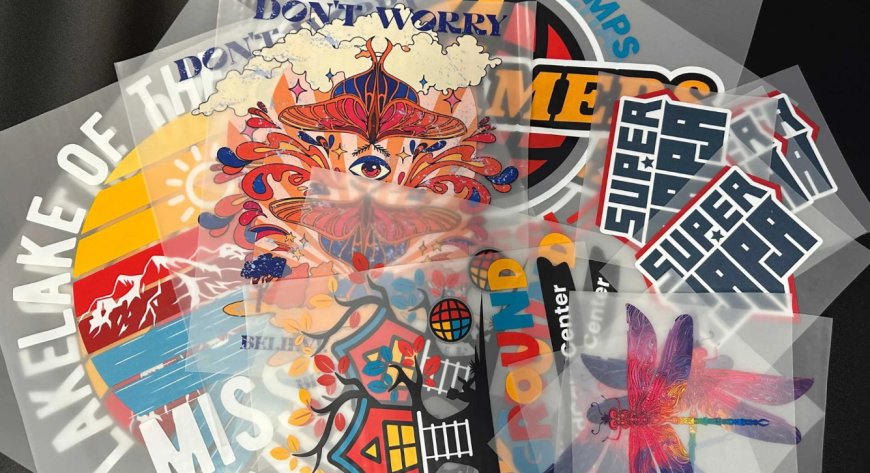Everything You Need to Know About Ordering DTF Transfers Ready to Press Wholesale for Bulk Projects

Introduction
If you're involved in custom apparel printing, you’ve probably heard about Direct-to-Film (DTF) transfers. But what exactly are they, and why should you consider ordering them ready to press in bulk for your next project? In this article, we’ll break it all down, giving you everything you need to know to make informed decisions for your business.
Understanding DTF Transfer Printing
What is DTF (Direct-to-Film) Technology?
DTF transfer printing is a cutting-edge method for transferring vibrant designs onto textiles. It’s done by printing designs onto a special film that’s later applied to fabric using heat and pressure. The result? High-quality, durable prints that can be applied to various fabric types.
The Process Behind DTF Transfers: From Design to Press
The DTF printing process begins with designing artwork digitally. Once the design is ready, it is printed onto a special film using a DTF printer. A layer of powder adhesive is then applied, which sticks to the printed design. The film is then cured, and the transfers are ready to be pressed onto fabrics.
Key Benefits of DTF Over Other Printing Methods
DTF offers several advantages over other printing methods like screen printing or heat transfer vinyl (HTV). These include the ability to print full-color designs, including intricate details, without the need for expensive setup costs. Plus, DTF transfers are more versatile, working well on various fabric types, including cotton, polyester, and blends.
Advantages of Ordering DTF Transfers Ready to Press
Time-saving for Bulk Orders
When you order DTF transfers ready to press, you save significant time. Instead of dealing with the printing and preparation process yourself, you simply receive the transfers, apply them to your garments, and you’re done.
Consistent Quality in Every Transfer
Bulk ordering ready-to-press DTF transfers ensures consistency across all your products. Whether you’re printing 10 or 1,000 shirts, you can count on the same high-quality result every time, which is crucial for maintaining customer satisfaction.
No Need for Specialized Equipment or Training
Since you’re ordering pre-printed and ready-to-press transfers, there’s no need to invest in expensive printing equipment or spend time learning how to operate complex machinery. All you need is a heat press and some basic skills.
Why Choose Wholesale DTF Transfers for Bulk Projects?
Cost-effectiveness of Ordering in Bulk
Ordering DTF transfers wholesale allows you to take advantage of discounts that come with purchasing in larger quantities. The more you order, the lower the per-unit cost becomes, making it a smart choice for businesses looking to save.
Scalability and Meeting High Demand
With bulk orders of DTF transfers, you can meet large or urgent demands without worrying about delays. Whether you’re fulfilling a large order for a client or preparing for a busy season, wholesale suppliers can help you scale up quickly.
Reliability of Wholesale Suppliers
Reputable wholesale DTF transfer suppliers are known for their consistency and quality. Working with a reliable supplier ensures you get a high-quality product every time, which can build trust with your customers.
Factors to Consider When Ordering DTF Transfers
Choosing the Right Supplier
Choosing the right DTF supplier is critical. Look for suppliers with a proven track record, positive customer reviews, and transparent practices. Ensure they offer the type of transfer materials and customization options you need.
Understanding the Minimum Order Quantities (MOQ)
Most wholesale suppliers set minimum order quantities for DTF transfers. Make sure the MOQ fits your needs and that you’re not stuck with more transfers than you can use. That being said, ordering in bulk usually results in better pricing.
Quality Control and Ensuring Consistency
Ask for samples or reviews to evaluate the quality of the DTF transfers. Consistency is key, especially when you’re working on large orders that need to match in color, size, and overall finish.
Customization Options Available
Many DTF transfer suppliers allow you to customize your transfers. From choosing specific colors to selecting specialty finishes like glitter or metallic effects, customization options can help make your designs stand out.
How to Order DTF Transfers Ready to Press
Step-by-step Guide for Placing an Order
Choose a supplier: Do your research and find a reputable DTF transfer supplier.
Select your design: Upload or provide the artwork you want to be printed.
Decide on your fabric and size options: Specify the types of garments or products you’ll be pressing the transfers onto.
Choose customization options: If available, select any special finishes or effects you want.
Place your order: Review your order, confirm the details, and finalize the purchase.
Common Mistakes to Avoid When Ordering
Not double-checking the quality of the transfers before placing a large order.
Forgetting to verify the compatibility of transfers with your fabrics.
Ordering the wrong size or type of transfer for your project.
Types of DTF Transfers Available
Full-color Designs
DTF printing can handle complex, multi-colored designs, which is ideal for logos, artwork, and full-color images. Whether you’re printing custom logos or intricate graphics, DTF can handle it all.
White Ink and Non-white Ink Transfers
DTF transfers come in both white ink and non-white ink varieties. White ink transfers are perfect for dark-colored fabrics, while non-white ink works well on lighter fabrics.
Specialty Finishes (Glitter, Matte, etc.)
You can also order DTF transfers with unique finishes. Want a glittery design? Or a matte finish? Many suppliers offer these specialty finishes to help make your designs pop.
Choosing the Right Paper for DTF Transfers
The Importance of Using the Right Transfer Paper
Not all transfer papers are created equal. Using the right DTF transfer paper is crucial for achieving vibrant and durable results. Be sure to choose paper that matches your fabric type and heat press settings.
Comparing Paper Options for Various Fabric Types
There are different types of transfer paper designed for various fabrics. Cotton, polyester, and mixed fabrics each require specific papers for optimal results. Ask your supplier for recommendations based on your project’s needs.
How DTF Transfers Perform on Different Fabrics
T-shirts and Cotton Fabrics
DTF transfers are highly effective on cotton fabrics, especially T-shirts. They provide vibrant prints and remain durable after multiple washes.
Polyester and Mixed Fabrics
DTF transfers also work well on polyester and polyester blends. They offer excellent durability and color retention, even on fabrics that are typically challenging for other printing methods.
Other Fabric Types and Compatibility
While DTF transfers work best on cotton and polyester, many other fabric types, such as spandex or canvas, can also be used with the right settings and transfer paper.
The Role of Heat Press in DTF Transfers
How a Heat Press Affects the Transfer Process
A heat press plays a significant role in the application of DTF transfers. It applies heat and pressure to bond the transfer onto the fabric, ensuring the print stays in place. Make sure you follow the manufacturer’s recommended settings for temperature, pressure, and time.
Key Factors for Successful Application (Temperature, Pressure, Time)
Get the right combination of temperature, pressure, and application time. Too much heat can damage the fabric, while too little heat can cause poor adhesion. Always perform a test run before applying to your full order.
Troubleshooting Common Issues with DTF Transfers
How to Fix Peeling or Fading Issues
If your DTF transfers start peeling or fading, it could be a result of incorrect heat settings, poor transfer paper, or incorrect washing instructions. Make sure to follow care instructions and troubleshoot accordingly.
Preventing Bubbling and Cracking
To prevent bubbling and cracking, ensure that your heat press is calibrated correctly. Using high-quality transfer paper and applying consistent pressure can also reduce these issues.
Ensuring Proper Adhesion
If the transfers aren’t sticking well to the fabric, it might be due to insufficient heat or pressure. Always check the settings and conduct test runs to avoid costly mistakes.
Maintaining the Quality and Durability of DTF Transfers
Caring for Products After Pressing
Proper post-press care is essential for maintaining the durability of your DTF transfers. Always follow washing instructions, avoid high heat drying, and consider air drying your garments for best results.
Washing and Long-term Durability of DTF Transfers
DTF transfers are built to last, but their longevity depends on proper care. Machine wash garments in cold water and avoid harsh chemicals to preserve the quality of the transfer.
Understanding the Pricing of DTF Transfers
How Pricing is Structured for Bulk Orders
Pricing for DTF transfers depends on factors like order quantity, design complexity, and customization options. Generally, larger orders result in lower prices per transfer.
Factors That Influence the Cost of DTF Transfers
Artwork complexity
Paper and ink quality
Special finishes or custom requests
Where to Find the Best DTF Transfer Suppliers
Popular Suppliers for Wholesale DTF Transfers
Some well-known suppliers in the industry include companies like Printful and Transfer Express, but be sure to compare multiple suppliers to find the one that best meets your needs.
How to Research and Select the Best Supplier
When researching suppliers, look for reviews, ratings, and testimonials from other customers. Quality, reliability, and customer service should be top priorities.
Conclusion
Ordering DTF transfers ready to press for bulk projects is a game-changer for custom printing businesses. It saves time, reduces setup costs, and ensures consistent, high-quality results. By understanding how DTF transfers work, how to select the right suppliers, and how to care for your finished products, you’ll be well on your way to running a successful print business.
What's Your Reaction?

















